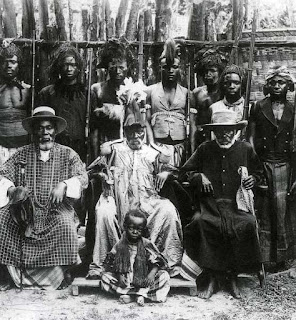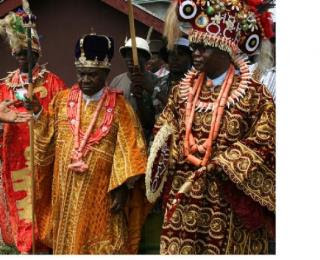Today it is recognized as a traditional state in what is now Rivers State, Nigeria.
According to one tradition, the Kalabari people originally came from Calabar (called "Old Calabar" by the Europeans), a site further to the east occupied by Efik people. This may have been a 19th-century invention. The Efik themselves say the name "Calabar" was given to their town by the Europeans. Other traditions say Kalabari was founded by Ijo settlers from Amafo, on the west bank of the New Calabar River, and that they were joined there by settlers from other communities.
The people occupied a series of islands among the mangrove swamps of the delta, where they engaged in fishing and trading. They would take the produce of the delta region up the New Calabar and Imo rivers, and exchange them for food and goods of the hinterland. In the 15th century, the early European traders noted that they alone of the delta people refused to trade on credit.
The people of Elem Kalabari originally worshipped the goddess Owemenakaso (or Awamenakaso, Akaso), the mother of all the deities of the Kalabari clan, even when individual settlements had their own local gods and goddesses. She opposed war and bloodshed, and the Kalabari later claimed she was the sister of the British goddess Brittana, who ruled the seas. Among their neighbors, because of their civilized and generally peaceful behavior the Kalabari were called "Englishmen".
A ruler named King Owerri Daba was said to have brought the slave trade to Kalabari and Bonny, and to have founded the houses of Duke Monmouth and Duke Africa. This happened some time before 1699, since James Barbot records giving presents to Duke Monmouth of Kalabari in that year. Kalabari became an entrepôt of the Atlantic slave trade, mainly selling slaves purchased from Igboland, further to the north.
Amachree I, who died around 1800, was the founder of the dynasty that bears his name. Most of the major trading houses expanded during his reign. In the 19th century, the Kalabari Kingdom was in the center of a power struggle in the east of the delta. Elem Kalabari fought against the Nembe Kingdom to the west, the Kingdom of Bonny to the southeast and Okrika to the northeast. The main rival was Okrika, which had the potential to block Kalabari's access to the interior. The Kalabari brought their goods down to Elem Ifoko, at the mouth of the New Calabar river, but refused to go the seven more miles to Bonny for the convenience of the European traders.
In July 1863, the feud with the Nembe people of Brass flared up, with the Nembe the decisive victors. By December 1865 the Okrika had started ambushing Kalabari trading canoes, and Bonny was threatening to join in since Kalabari was blocking their passage through Kalabari territory. The British consul had to intervene to prevent further hostilities. When Jubo Jubogha ("Ja-Ja") moved from Bonny in 1869 and established the separate state of Opobo, he became an ally of Kalabari. Bonny now began a more serious push into Kalabari territory to recover from loss of trade to Opobo. In 1873 a perpetual treaty of peace was signed between Kalabari and Bonny on the same day that a treaty was signed between two rival factions within Kalabari.
Neither of these treaties was observed. In July 1882 the British consul had to intervene again in the struggle with Bonny. From 1882 to 1884 two factions of the royal family continued to struggle for control. The Amakiri faction succeeeded, while the Barboy or Will Braide group moved to the new settlement of Bakana. Soon after, the victors also evacuated Elem Kalabari, moving to the new capital of Buguma and to Abonnema, both further inland. The European traders followed them, now going up the Sombreiro River to Abonnema.
According to one tradition, the Kalabari people originally came from Calabar (called "Old Calabar" by the Europeans), a site further to the east occupied by Efik people. This may have been a 19th-century invention. The Efik themselves say the name "Calabar" was given to their town by the Europeans. Other traditions say Kalabari was founded by Ijo settlers from Amafo, on the west bank of the New Calabar River, and that they were joined there by settlers from other communities.
The people occupied a series of islands among the mangrove swamps of the delta, where they engaged in fishing and trading. They would take the produce of the delta region up the New Calabar and Imo rivers, and exchange them for food and goods of the hinterland. In the 15th century, the early European traders noted that they alone of the delta people refused to trade on credit.
The people of Elem Kalabari originally worshipped the goddess Owemenakaso (or Awamenakaso, Akaso), the mother of all the deities of the Kalabari clan, even when individual settlements had their own local gods and goddesses. She opposed war and bloodshed, and the Kalabari later claimed she was the sister of the British goddess Brittana, who ruled the seas. Among their neighbors, because of their civilized and generally peaceful behavior the Kalabari were called "Englishmen".
A ruler named King Owerri Daba was said to have brought the slave trade to Kalabari and Bonny, and to have founded the houses of Duke Monmouth and Duke Africa. This happened some time before 1699, since James Barbot records giving presents to Duke Monmouth of Kalabari in that year. Kalabari became an entrepôt of the Atlantic slave trade, mainly selling slaves purchased from Igboland, further to the north.
Amachree I, who died around 1800, was the founder of the dynasty that bears his name. Most of the major trading houses expanded during his reign. In the 19th century, the Kalabari Kingdom was in the center of a power struggle in the east of the delta. Elem Kalabari fought against the Nembe Kingdom to the west, the Kingdom of Bonny to the southeast and Okrika to the northeast. The main rival was Okrika, which had the potential to block Kalabari's access to the interior. The Kalabari brought their goods down to Elem Ifoko, at the mouth of the New Calabar river, but refused to go the seven more miles to Bonny for the convenience of the European traders.
In July 1863, the feud with the Nembe people of Brass flared up, with the Nembe the decisive victors. By December 1865 the Okrika had started ambushing Kalabari trading canoes, and Bonny was threatening to join in since Kalabari was blocking their passage through Kalabari territory. The British consul had to intervene to prevent further hostilities. When Jubo Jubogha ("Ja-Ja") moved from Bonny in 1869 and established the separate state of Opobo, he became an ally of Kalabari. Bonny now began a more serious push into Kalabari territory to recover from loss of trade to Opobo. In 1873 a perpetual treaty of peace was signed between Kalabari and Bonny on the same day that a treaty was signed between two rival factions within Kalabari.
Neither of these treaties was observed. In July 1882 the British consul had to intervene again in the struggle with Bonny. From 1882 to 1884 two factions of the royal family continued to struggle for control. The Amakiri faction succeeeded, while the Barboy or Will Braide group moved to the new settlement of Bakana. Soon after, the victors also evacuated Elem Kalabari, moving to the new capital of Buguma and to Abonnema, both further inland. The European traders followed them, now going up the Sombreiro River to Abonnema.
The government of Kalabari had now become a council of powerful chiefs headed by a king with little power, a structure that has survived to this day.
THE OWU-ARU-SUN FESTIVAL OF THE KALABARI KINGDOM (IN PRESENT-DAY RIVERS STATE OF NIGERIA)
For a Kalabari, culture is a way of life and forms part of daily life. The Owu-Aru-Sun Alali is a series of masquerade display by the Kalabari people of the Niger Delta Region of Nigeria.
Oral Tradition has it that the festival is usually performed after the exhaustion of the various masquerades owned by both the community and the groups or compunds which usually last for between 15 to 20 years.
Tracing the Genesis of Ou-Aru-Sun, it can be recalled that it was celebrated in Buguma City previously in 1908, 1927, 1973 and 1991 by the Ekine Sekiapu under the leadership of the Opu Edi.
The Ekine (it's proper name) and Sekiapu (dancers) are the custodian of the Kalabari customs and traditions right from the old shipping (Elem Ama) till date. The Ekine also formed the nucleus of the traditional Government of the Kalabari people which includes the maintenance of law and order, including matters of arbitration where punishment were meted out to offenders according to the laws of the land.
The Owu-Aru-Sun Alali is the festival of the highest cultural display that has ever been witnessed in the socio-cultural organisation of the Kalabari people. Where the masked players in these dances were said to represent the water spirits, (Owu), to whom the Ekine ministered. The unique beautiful scenario of masked masquerades in colourful outfits and dancing in the special steps and styles and styles of their compounds is a sight to behold after which the Owu is said to be returned to the Ocean where they are said to reside.
While some of these masquerades are owned and performed by the entire community, some are owned by particular chiefs and compounds such as the Alagba by the Abbi group, the Peri-gbo by Georges Compund, Bekinaru Sibi by Wokoma Compound, Gbasa of the Onbo group. The major masquerades are always played during the dry season with about three plays annually over a long period which ranges between 15-20 years as said earlier. After the last group of masquerades have performed, the Ekine Sikiapu through the town crier intimates the people of the need for preparation for the next Owu-Aru-Sun Alali. The town crier (Kpo kpo gbo la bo) having done this, Head Chiefs of the various canoe houses and compounds who own masquerades harnesses with it's people on how to put up it's best performance and sometimes also involves services of experts in the assembling of headpieces and costumes.








No comments:
Post a Comment